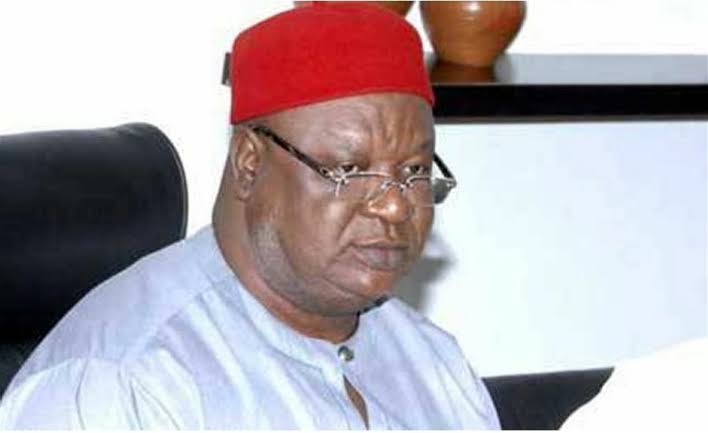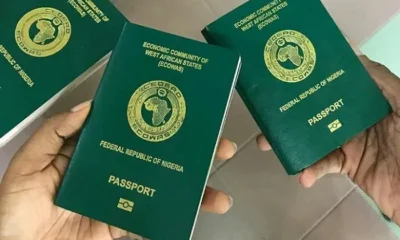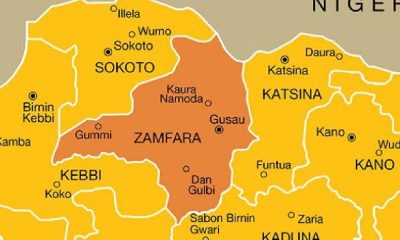News
Akpabio hails Anyim at 63

President of the Senate, Senator Godswill Akpabio, has congratulated a former President of the upper chamber, Senator Anyim Pius Anyim, as he marks his 63rd birthday.
Akpabio, in a birthday message signed by Special Adviser on Media and Publicity, Hon. Eseme Eyiboh described Anyim, as a “True democrat and accomplished politician.”
He applauded Senator Anyim’s efforts in fighting for and instituting legislative independence in the Senate in his hey days as the presiding officer.
“On behalf of my family, constituents, the Senate and the National Assembly, I wish to heartily rejoice with one of my predecessors, a gentleman and learned brother, Distinguished Senator Anyim Pius Anyim, GCON on his 63rd birthday. I pray to the Almighty God to bless him with many more healthy and fruitful years ahead”
Akpabio said “I must acknowledge the indelible role played by Senator Anyim in the growth and sustenance of our current democratic experience. He is indeed, one of the pillars of the 4th Republic, who have played significant roles in giving life to our democracy.
“As a statesman and true democrat, Senator Anyim was able to mobilise men of thought and conscience when our late President, Umaru Musa Yar’Adua was ill to guide the National Assembly to ensure that there was no vacuum and the process of transmitting power was seamless.
“As Secretary to the Government of the Federation under President Goodluck Jonathan, he brought his experience to bear on the administration. He has remained a committed party man, promoting peace and unity and working for good governance in the country”, Akpabio stated.
News
Nigeria’s Strategic Foreign Policy Dilemma: Domestic Politics, Regional Instability, Russia’s Encroaching Geopolitical Influence in West Africa and Sahel

News
Alleged N8bn scam: Achimugu yet to fulfill EFCC bail conditions

Embattled businesswoman Aisha Achimugu is yet to meet the bail conditions set by the Economic and Financial Crimes Commission (EFCC) because her two sureties have no landed property in Abuja.
Aisha was still in custody at the weekend over alleged N8.71billion oil bloc transactions.
The EFCC will on Monday verify the claims of new two sureties.
A top EFCC source said: “Aisha is still in detention until she meets the bail conditions.
“The court mandated the EFCC to set bail conditions. We asked her to bring two sureties with landed property in Abuja. Her sureties could not meet our terms.
She produced new sureties on Friday. We will verify the claims of those standing for her on Monday.
If these sureties do not fulfill the required conditions, she will remain with us.”
She, however, will account for how she came about 136 bank accounts, especially corporate types.
Mrs. Achimugu was declared wanted by the EFCC in March 2025 on allegations of criminal conspiracy and money laundering.
According to an affidavit by an EFCC investigator, Nr. Chris Odofin, Mrs. Achimugu was under investigation for alleged conspiracy, obtaining money by false pretence, money laundering, corruption, and possession of property reasonably suspected to have been acquired through unlawful means
The affidavit also showed the applicant operates a total of 136 bank accounts across 10 different banks, both personal and corporate.
Achimugu, in her statement according to the affidavit, said the inflow of N8.71 billion into her corporate bank accounts was an ”investment fund” for acquisition of an oil bloc.
She said the cash was transferred to the Federal Government’s account through her company, Oceangate Engineering Oil and Gas Limited, referencing documentation from the Nigerian Upstream Petroleum Regulatory Commission (NUPRC).
But findings by the EFCC confirmed that Achimugu’s company actually acquired two oil blocs, Shallow Water PPL 3007 and Deep Offshore PPL 302-DO at the cost of $25.3 million.
The payments were allegedly made through bureau de change operators.
The EFCC was looking at clues on the likely sources of the funds.
The commission also alleged that the acquisition of the oil blocs was not transparent enough.
Nation
News
Police nab kidnapper after transfer of N70m from victim’s account

Delta State Police Command has apprehended suspected kidnappers who transferred N70 million from a victim’s bank account after carting away his GLC Mercedes-Benz car along Abraka in Ethiope-East Local Government Area of Delta State.
Sunday Vanguard gathered that the Divisional Police Officer, DPO, Abraka, CSP Fabian promptly launched an investigation into the matter after it was reported by the victim (name withheld)
The vehicle was tracked to a hotel in Benin City, Edo State by SP Fabian’s men in collaboration with policemen from the Oba Market Division.
The suspects were arrested with the car, with the money still in their account at the hotel.
Narrating how the incident happened, human rights activist, Comrade Israel Joe, said, “Early hours of May 1, 2025, a young man was kidnapped and robbed at Abraka, with his car GLC. They took the car away and transferred about N70 million from this his account.”
-

 Education21 hours ago
Education21 hours agoJAMB Announces Date For Release Of 2025 UTME Results
-

 News23 hours ago
News23 hours agoUngrateful, disrespectful– Saida BOJ slams VeryDarkMan despite EFCC ordeal
-

 Entertainment24 hours ago
Entertainment24 hours agoVDM’s brother raises alarm, alleges his brother was ‘well’ beaten during arrest
-

 News8 hours ago
News8 hours agoFive Asian countries Nigerians can visit without a visa
-

 Economy24 hours ago
Economy24 hours agoNaira Records Marginal Decline Against Dollar at Official Market
-

 Entertainment8 hours ago
Entertainment8 hours agoOld Prophecy Of Pastor About VeryDarkman Goes Viral After His Arrest
-

 News8 hours ago
News8 hours agoEzekwesili slams political establishment over harassment allegation, defends Natasha
-

 News8 hours ago
News8 hours agoInsecurity! Bandits abduct 25 female wedding guests






